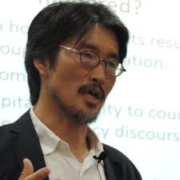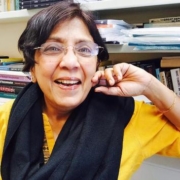Kirsi Yliniva & Audrey Bryan
Education’s Neuro-Affective Turn
Today we unpack the neuro-affective turn in education. With me are Kirsi Yliniva and Audrey Bryan.
Kirsi Yliniva is a PhD researcher and university teacher in the Faculty of Education and Psychology at the University of Oulu. Audrey Bryan is an associate professor of sociology in the School of Human Development at Dublin City University’s Institute of Education. Together with Kristiina Brunila, they have recently published the article “‘The future we want’? – The ideal twenty-first century learner and education’s neuro-affective turn.”
Citation: Yliniva, Kirsi, Bryan, Audrey, with Will Brehm, FreshEd, 360, podcast audio, July 22, 2024. https://freshedpodcast.com/yliniva-bryan/
Will Brehm 0:01
Kirsi Yliniva and Audrey Bryan, welcome to FreshEd.
Kirsi Yliniva 1:18
Thank you very much.
Audrey Bryan 1:19
Thanks, Will. Good to be here.
Will Brehm 1:21
So, congratulations on your new article. It’s really quite a fantastic piece in Comparative Education. I want to just jump right into it. So, Kirsi, you say in the article that there has been this sort of neuro-affective turn in education. I kind of love that idea but maybe you could just sort of tell me what this actually means in your mind, and why you consider it to be sort of a Zeitgeist today.
Kirsi Yliniva 1:44
Yeah, so by neuro-affective turn in education, we mean that educational research and practice and policy is increasingly leaning on information and also language and knowledge derived from behavioral and life sciences, for example, from psychology and neurosciences or neurobiology. And while, this development dates back some way, but it has intensified recently in relation to this kind of new medical and technological developments, such as those in genetics and neurobiology, and also the development of new digital tools, and for example, AI. And this development is also connected to the rise of so-called learning sciences in education. And from the perspective of the learning sciences, the efficacy of learning can be improved by influencing the brain and also its kind of psycho-affective dimensions, such as, for example, motivation and attitudes and emotions, and also so called non-cognitive skills and competences, such as, for example, wellbeing and embody mindfulness and this kind of adaptive attitude. And from neuro-affective perspective, these skills and competences are seen as very important for adapting to challenges of this 21st century.
Will Brehm 3:18
What I like about it is that these different trends that I’ve seen in education, from wellbeing and mindfulness to the sort of brain sciences and how it impacts learning. And trying to do brain scans to figure out how learning actually happens, you sort of pull it all together in that term, the neuro-affective turn in education. And so, these trends sort of predate the turn, but sort of all came together to make this particular way of understanding the quote, unquote, 21st century learner possible.
Audrey Bryan 3:50
Just to pick up on what Kirsi has been saying, you know about this neuro-affective turn, and I suppose the social, emotional dimensions of it. And I think one of the things that struck us and what motivated us to write the article was the ways in which different international organizations or institutions that historically had very different understandings of education, very much singing from the same hymn sheet in relation to these aspects of the kind of the non-cognitive aspects of learning. So, you know, I think one of the most obvious places where we’re seeing this neuro-affective turn is in the realm of social and emotional learning, which is a movement that’s shaped by the neurosciences, by behavioral economics, and by positive psychology, or what I’ve kind of elsewhere, referred to as kind of the Holy Trinity. So, these fields are becoming increasingly influential, or these sub fields, or sub disciplines are becoming increasingly influential within these different organizations. Also, I think what was interesting about this was that if we look at an organization like the OECD, for example, I mean, it was primarily interested in the cognitive aspects of learning. So, we’re very familiar with all of these international assessments that are very numeracy and literacy focused -these kinds of comparative assessments that the OECD runs. But we were kind of intrigued by what the OECD is calling its “new growth narrative”. So, Kirsi has already alluded to the kind of wellbeing agenda, and so what’s variously referred to as social emotional learning or transversal or 21st century skills are now being very much foregrounded within institutions like the OECD. So, for example, they now administer a survey of social and emotional skills to 10- and 15-year-olds assessing things ranging from their persistence, their motivation, their sense of optimism, how they handle stress, how they regulate their emotions. So, a whole range of so called non-cognitive skills are being captured and assessed. And in fact, last week, I think the OECD held a webinar on innovative assessments in social and emotional learning. And I mean, what was interesting about that is, they’re kind of critiquing their own ways of assessing social emotional skills, arguing that, you know, these existing kind of survey-based instruments, they’re not objective, you know, because they’re based on self-report. So, they’re asking parents and teachers and children about their social and emotional skills. And they’re looking into different ways of capturing social emotional learning. So, linking back to what Kirsi was saying, you know, looking at kind of bio data, looking at physiological data. So, they’re talking about things like eye tracking and cardiac rates and cortisol levels, because the argument is that these give us insights into the internal lives of children and provide kind of spontaneous data that’s much more objective. Now I think it’s arguable to what extent that’s actually the case. You know, we’re talking about something so complicated as emotions, but it is interesting that the OECD having been so invested in cognitive skills for a long time -because ultimately, it’s an economic organization, right? And it’s all about enabling its member countries to grow their economies, but it’s becoming more and more invested in these more kind of touchy feely, sort of aspects or domains of learning.
Will Brehm 7:29
And that’s what’s so quite fascinating about it. And the OECD is such a good example of how this neuro-affective turn is a zeitgeist, because even organizations like the OECD that are so focused and have been so focused on cognitive skills in education, are embracing and moving in a direction that is, in a way, completely opposite of this notion of cognitive skills, and it sort of creates this interesting dynamic that is a bit paradoxical, right? To have them critique a survey that they’ve been using for so long. It’s kind of interesting and maybe frightening as well. But Kirsi, I want to go back to you because the other sort of context in this paper is that it’s not simply this neuro-affective turn that is sort of the moment, but there’s another issue around precision education governance. So, what exactly is precision education governance, and how is it connected to some of this neuro-affective turn in education that we see?
Kirsi Yliniva 8:28
So, the precision education governance is very closely aligned with the education’s neuro-affective turn. So, precision education governance is this kind of concept developed in the project in University of Helsinki, where I am affiliated with, and which is led by Professor Kristiina Brunila and Kristiina is also the co-author in this article. And precision education governance for short, “PEG” is an umbrella concept which was designed to bring together these kind of three major overlapping, ongoing transformations in education, which are all linked together. And the first one is that education is increasingly connected globally. And the second pillar is that the emergence of behavioral and life sciences in education, such as we already talked about a little bit. And the third pillar is this kind of increasing marketization, privatization, digitalization, and datafication of education. So, the first pillar describes that education is increasingly cornered by multiple local and global actors such as governments, but also these kinds of international organizations, such as OECD and UNESCO, and also civil society organizations, but also more and more global corporations and ed tech -the education technology industry is part of the education governance. And the second pillar describes that PEG reinforces the influence of the behavioral and life sciences in education. And the third pillar describes that PEG also encourages marketization and privatization and commodification of education and promotes digital learning platforms and also AI and algorithms used in education, which can also monitor and facilitate learning and also, importantly, collect data from the learners. And this, of course, opens, then the platforms for private business and global companies in education.
Will Brehm 10:45
To connect it to what Audrey was saying before about tracking the eye movements as an objective way of trying to understand some sort of emotion and how students might learn that emotion over time. You can see, I guess, you know, in a way, what you’re sort of saying -an example here would be; those eye trackers would have to be bought from some company. The data that’s collected would have to be processed and analyzed, potentially using some sort of algorithm, which might also be owned by some company. So, all of this datafication is sort of feeding that marketization of education, but it’s under the logic that we can be more precise in how we know if learning is or is not happening, and then how we might then govern the spaces of education. Is that sort of this idea here?
Kirsi Yliniva 11:31
Yes. It is very much like that. And also important with that data is that, of course, it’s said that the data is used for facilitating learning and making learning more precise and individualized and personalized and tailored for individual students. But of course, when there is the case the private companies, we don’t know how they really use the data, and it probably is also used in their own interests and commercial interests.
Will Brehm 11:57
So, maybe we can sort of unpack the OECD a little bit more, Audrey. You’ve begun to explain the OECD and why it’s quite an interesting organization to look at as it embraces this zeitgeist. And so, one of the terms that you pick up on in the article is the resilient learner. Can you explain what the resilient learner is to the OECD and why you think it’s important vis a vis the neuro-affective turn and the precision education governance?
Audrey Bryan 12:29
Yeah. So, resilience is one of those kinds of buzzwords, you know, and it tends to be defined as the capacity to bounce back, or to bounce forward, even, in the face of adversity, right? So, that’s kind of the typical sort of definition. The resilient learner, which is an expression that the OECD themselves use in some of their policy documents, is really pivotal to the institution’s vision of the future of education. So, in the OECD policy documents that we analyzed for the paper, the resilient learner is defined as someone who seeks out opportunities to thrive in new or difficult circumstances, and as someone who can move forward in the face of adversity. So, for us, I suppose, the resilient learner is almost like this Teflon coated student, who’s armed with this protective layer such that whatever life throws at them -whether it’s precarious or employment or post-employment, or climate crisis- whatever is thrown their way never sticks, or at least it doesn’t stick long enough to deter them from being academically successful and economically productive. So, we try to unpack this concept, this kind of idealized vision of the 21st century learner and resilience is very much at the heart of that, and we try to problematize that construct for several reasons, not least because it promotes an ideology of endurance rather than advancing the conditions of transformation and social betterment. So, it’s very much about conditioning the learner to adapt, to endure, to withstand the existing kind of political economic context, rather than equipping them with the tools to try to alter those circumstances, and this we feel, kind of legitimizes and prepares students for “business as usual” ways of seeing and behaving in the world, rather than as change agents who can repair and transform it.
Will Brehm 14:38
And in a way, that’s not surprising that that would be coming from the OECD, is it?
Audrey Bryan 14:42
No, it’s not surprising in the sense that it’s very much rooted in this kind of neoliberal model. But I suppose what is surprising is that the ways in which this is getting attached and aligned with, I suppose other affiliated discourses, and whether that’s as part of the wider wellbeing agenda. So, it’s almost like this attempt to give the OECD a humanitarian face, and it’s partly probably linked to PISA fatigue on one level. But I think there’s other factors at play as well. And this was one of the things we tried to do in the article, is look at the ways in which it’s not just the OECD. So that other organizations are kind of aligning themselves with this new kind of wellbeing and social emotional learning agenda. So, we also look at the role of UNESCO in advancing this global consensus around social and emotional learning.
Will Brehm 15:43
I guess that’s where it gets quite interesting, is that, you know, on the one hand, you might think the OECD, it’s sort of advancing its normal agenda, just sort of in a new discourse, or in a new set of discourses that aligns with the zeitgeist of the moment. But you also show, interestingly that some of these ideas have come into the way in which UNESCO is operating currently. So, where do we see the nuero-affective turn and precision education governance in UNESCO?
Audrey Bryan 16:14
Yeah, it’s a really interesting question. Again, our analysis shows that, like we see it particularly coming from the UNESCO Mahatma Gandhi Institute of Education for Peace and Sustainable Development, which is quite a mouthful, so I’m just going to refer to it as MGIEP for short. And MGIEP is one of those UNESCO Category 1 research institutes, right? So, interestingly, its stated mission is to build kinder brains and to transform education for social and emotional learning. So, its remit really is SDG, 4.7. So, everything to do with global citizenship education, peace education, human rights education, but as an institution which is relatively young -I think it’s just about a decade or so old at this point- it has very much aligned itself with this neuro-affective turn. So, it very much privileges the kind of the narrative of the neurosciences and the behavioral sciences. And it very much invokes in a lot of its policy documents -it invokes this brain-based imagery and speaks about emotions through a neurological lens. And from this vantage point, I suppose qualities like empathy and compassion are very much seen as the route to global transformation, right, and very much interested in mindfulness as a means of addressing all manner of social and global injustices, ranging from bullying to extreme forms of violence. So, what we’re witnessing, I think within these different arms of UNESCO are the embrace of social emotional learning, which, as we’ve said, it’s essentially an instrumentalist discourse, right? You look at the kind of the origins of social emotional learning, initially, it was very much linked to concerns around academic outcomes and productivity. So, its roots are very much in the kind of instrumentalist landscape, and it’s kind of being attached now to more justice oriented adjectival educations like education for sustainable development and the SDGs. And I suppose one of the arguments that we’re making in the article is this is somewhat compromising for an organization like UNESCO, right? Because unlike, say, the OECD or the World Bank, UNESCO has always stressed the intrinsic value of education and its role in enhancing prospects for peace, social justice and sustainable development. So, we have some concerns in terms of what this means for UNESCO as an organization.
Will Brehm 18:57
I guess UNESCO is made up of multiple sorts of institutions, in a way, right? So, you know, to what extent is what’s going on at the Mahatma Gandhi Institute, let’s call it, to what extent is that being, sort of the discourse that is seen across like at UNESCO headquarters, in the UNESCO Institute of Statistics, or IIEP, right? There’s all sorts of other agencies that are sort of connected to UNESCO that might not share the same ideas as the Mahatma Gandhi Institute.
Audrey Bryan 19:27
Yes, but interestingly, I mean, and this was one thing we were quite concerned about, you know, because Absolutely. I mean, no international organization is monolithic, right? So, methodologically, we looked at multiple documents, and what we discovered is that social emotional learning plays a very central role in UNESCO’s wider vision for the futures of education. So, whereas the kind of central construct that we explored in relation to the OECD is the resilient learner, what we found was that across UNESCO documents, its ideal version of 21st century learner can be encapsulated through the phrase of the empathic learner. So, when we looked at the UNESCO Futures of Education report, which is a major landmark UNESCO document, we found that social emotional learning is quite central to that narrative of how a better future can be realized. And the empathic learner is somebody who’s imbued with the capacity to imagine and identify with the suffering of others by putting themselves in their shoes, right? So, as that sort of saying goes. And within that UNESCO Futures report, we see that empathy is defined as the ability to attend and feel with other people, and its blueprint for transforming education explicitly mentioned social and emotional learning numerous times. So, it’s not just within individual kind of research institutes where we’re seeing this increasing move towards the neuro-affective. So, compassion and empathy in particular are identified as foundational to the pedagogies of cooperation and solidarity that are a central feature of that report. And I suppose our concern with that really is that we don’t really feel that enduring injustices can be overcome simply by putting yourself in the shoes of another person. We just don’t feel that this kind of cuts it as a means of bringing about social transformation. And our other concern with that is that this kind of positioning of learners as compassionate and benevolent precludes deeper understandings of the ways that human beings are, in fact, implicated in perpetuating rather than alleviating injustices. So, it sort of positions the learner in this space of innocence, rather than encouraging, particularly those of us who are living in emissions intensive societies in the global north -I mean, you know these questions around complicity, responsibility, implication, these are very like important questions for young people to address in terms of from a climate justice perspective. But if the learner is positioned as this empathic, compassionate person, it’s much harder to see oneself as playing a significant part in the perpetuation of various social and global justices.
Will Brehm 22:33
It’s really quite interesting how you point out a lot of that sort of depoliticization that happens through some of these discourses, in the way the learner gets positioned or not. Kirsi, I wanted to bring you back in to sort of unpack a little bit more about these two different organizations’ discourses and how they sort of propose to overcome some of the crises that humanity faces, and in particular the way in which they sort of use notions of transhumanism and post-humanism, which are -in the academic literature- becoming more and more popular. But how are some of these discourses getting woven into the way in which these organizations understand the solutions to the problems that they’ve been showing exist?
Kirsi Yliniva 23:19
Yeah, like Audrey already elaborated, some of these solutions these organizations propose for these multiple 21st century crises humanity faces today, such as climate change but also wars and political polarization and also the technological and economic changes and labor market changes is, of course, the resilience. So, they’re fostering students’ resilience so that they are able to recover more quickly from the disasters and thrive despite of them. And the other one is also what Audrey already mentioned, the empathy and compassion. But the third one like you asked is what we bring out in this article is this techno-scientific and transhumanist solution, which are especially common in the OECD and also the UNESCO MGIEP document. So, they are these kind of solutions for the problems, which are technological and scientific, such as advancements in the biotech industry, or genetics, or AI, for example, and especially the OECD and MGIEP are hopeful that this kind of better, maybe sustainable and peaceful and greener futures can be achieved through technology and digitalization and using AI and also through this kind of human enhancement technologies such as theological or neurological human enhancement or genetic engineering, for example. And of course, again, aided by information from the behavioral and life sciences. And this kind of approach also proposed, increasingly, this kind of virtual and technological and also hybrid world and also education, where this kind of traditional palm trees between humans and machines, or human and technology, or nature and technology and physical are virtual, are being blurred increasingly. But you also mentioned the post-humanism and yeah, we found that the certain sections, not the whole report, but certain sections of the UNESCO Futures report tries to challenge this kind of techno-scientific and transhumanist discourse by promoting this kind of more post-humanist perspective, which highlights these kind of interdependencies between humans and modern humans, such as plants and animals and nature, and proposed that humans are not separate from the other environment or nature or other life forms, but interconnected and also dependent on other life forms. And this perspective also criticized this kind of human-centric understanding of the agency and understanding that humans are separate and powerful actors in the world. And also, interestingly, this new OECD PISA 2025 Science Framework, also positions students as part of, rather than separate, of ecosystems, and highlights this kind of interdependence of life. But we also argue that this kind of post-humanist perspective doesn’t necessarily bring the challenge to the earlier mentioned solutions which highlight this kind of adaptation and techno-scientific solutions. And this is because this post-humanist perspective quite radically problematizes the human agency and also the political agency, which positions humans as powerful actors in the world, and still can be seen as presupposing a division between humans and their environment. So, also post-humanism, as with transhumanism blurs this kind of traditional boundaries between humans and non-humans, including also machines and technologies. And if we think about again, the transhumanism, so it is quite contrary to post-humanism highlights this kind of human agency and sees humans and human made technology very powerful. But we also argue that it also de politicizes human agency and dismisses social and political emancipation because it highlights people’s resilience to the crisis through this kind of techno-scientific adaptation of humanity. So, it really is not the case that the transhumanism would dream about politically changing the world, but more like biomedically adapting to the world how it is. So, in other words, when techno-scientific solutions are to solve the problems of the humanity, the task of ordinary population is to be resilient and adapt in the crisis.
Will Brehm 28:36
It’s so depressing in my mind. You just think, gosh, are we really just so naive that technology is going to come and solve all of our problems, and everything is just somehow, this issue of getting the brain waves just right so we can solve all of our problems. I mean, it just blows my mind. So, Audrey, I mean, I guess to sort of conclude here, you know, looking at OECD and UNESCO, how do they see the future here? I know we brought up the Futures Report a little bit, but are the OECD and UNESCO envisioning a pretty similar future that’s sort of based on what Kirsi was just talking about, this techno-solutionism?
Audrey Bryan 29:14
That’s such a good question, Will and I agree. I think in many ways, this is such a sort of a terrifying vista. I mean, I think it’s fair to say that the OECD’s future resembles something out of a dystopian novel, where, like, despite the lack of promise for a better future, despite all of their rhetoric around constructing kind of hopeful learners, I mean, that they’re not giving us any cause for hope. But yet, children and young people are somehow expected to be optimistic, to be hopeful, to be resilient, in the face of these constant shocks and crises. And I suppose, to my mind, this is kind of reminiscent of Aldous Huxley’s Brave New World, right, where things like entertainment and, you know, all these mind-altering techniques, they’re the things that ensures the happiness and facility of its citizenry. I think it’s quite a dystopian kind of vision that the OECD are painting, but it’s a bit more complicated with UNESCO, right? So, depending on which UNESCO report you read, its vision of the future could be read as either utopian or dystopian. So, there’s a review of the Futures of Education report written by Marin Alford and Paul Morris, and one of the things they argue in that is that, like the UNESCO Futures Report, presents us with this beautiful vision of how we should be living on the planet, but giving us virtually nothing in terms of substance, in terms of how we can actually go about realizing this alternative future. So, we’re presented with this alternative and kind of better vision of the future and of humanity, but the details are really lacking. So, I think that’s one of the kind of limitations of the report. The report has a lot of strength. So, it’s not like we’re trying to present, you know, this uniformly negative picture. It says a lot of really important things around for example, you know, teacher autonomy. So, there’s a lot to be said for it. But then, if you look at these kinds of other reports that are coming out under the imprimatur of UNESCO, such as MGIEP’s Reimagining Education report, it’s utterly preoccupied with brains, with the pursuit of human flourishing, and through, you know, all of these things that Kirsi has alluded to in terms of this kind of, you know, socio-emotional adaptation to the given political economic context. And in this sense, this is also, I think, presenting us with a very kind of dystopian vision in ways. Talking about having global databases of student data like it is literally something out of a dystopian novel. And of course, this is very much in the interest of big tech and global corporations. And I suppose one of the kinds of key arguments that we’re trying to make in the article is for institutions that had very kind of historically divergent views around and understandings of the purposes of education, we’re seeing a growing kind of ideological convergence or alignment around this neuro-effective turn and this precision education governance space. So, it’s something to watch as you know, we’re kind of -it’s kind of too early to tell you know to what extent there will be even deepening alignment, but we’re cautious and we’re concerned about it. So, that was one of the rationales for working on this piece.
Will Brehm 32:32
Kirsi Yliniva and Audrey Bryan, thank you so much for joining FreshEd. Congratulations again on your paper, and I guess come back on to tell us how things unfold in the future.
Kirsi Yliniva 32:43
Thank you so much.
Audrey Bryan 32:44
Thank you so much, Will. It’s been a pleasure. Thank you.
Want to help translate this show? Please contact info@freshedpodcast.com
Related Guest Publications/Projects
The ideal twenty-first century learner and education’s neuro-affective turn
Affective pedagogies: Foregrounding emotion in climate change education
Pedagogy of the implicated: Advancing a social ecology of responsibility framework
Mentioned
Innovative tools for the direct assessment of social and emotional learning skills – OECD
Education for the future? Mapping the emerging lines of precision education governance
Precision education governance and the high risks of fabrication of future-oriented learning
UNESCO Mahatma Gandhi Institute for Education for Peace and Sustainable Development
Reimagining our futures together: A new social contract for education – UNESCO report
Learning for empathy: A multinational effort to build peace through education – UNESCO
Transhumanism: From Julian Huxley to UNESCO
Rethinking Learning – UNESCO MGIEP document
OECD 2025 PISA science framework
Brave New World – Aldous Leonard Huxley
A review of the UNESCO report “Reimagining our futures together: A new social contract
Recommended
Algorithms of education: How datafication and artificial intelligence shape policy
Strengthening social and emotional learning in hybrid modes of education – UNESCO IBE Report
Posthumanism vs. transhumanism: From the end of exceptionalism to technological humanism
Noncognitive skills in the classroom: New perspectives on educational research
The case for noncognitive assessments
Non-cognitive skills as human capital
Survey on social and emotional skills (SSES)
Fundamental themes in social-emotional learning
AI, 21st century competences, and socio-emotional learning in education
Education, techno-solutionism, and sustainable development
Have any useful resources related to this show? Please send them to info@freshedpodcast.com









